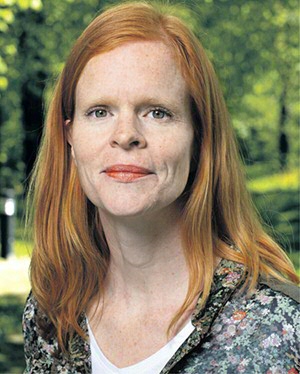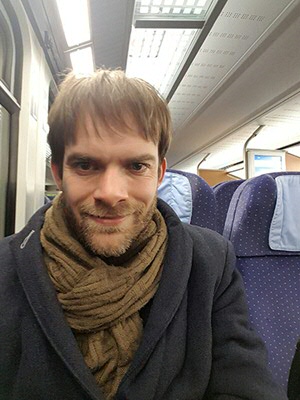ERC grants help two UG scientists to aim for the top
Two University of Groningen researchers have been awarded an ERC Consolidator Grant. The recipients are Geert van den Bogaart and Marleen Kamperman. The European Research Council (ERC) awards these personal grants, each worth € 2 million, to outstanding scientists with the aim of stimulating ground-breaking research in Europe.

About Marleen Kamperman and her research
Prof. Marleen Kamperman (1979) studied Physics at the University of Groningen (UG) and was awarded her doctorate in 2008 at Cornell University in Ithaca, New York. She worked as a postdoctoral researcher at the Leibniz Institute for New Materials in Saarbrücken (Germany) and as assistant professor and associate professor at Wageningen University & Research. Since September 2018, she has been Professor of Polymer Science at the Zernike Institute for Advanced Materials (ZIAM) of the UG. Here, Kamperman focuses on making new materials, such as the long, organic molecules that are often known as polymers.
Kamperman: ‘I look at softer materials that are suitable for biomedical applications, among other things. My focus now lies on adhesives that stick well to wet surfaces. These could be used in the human body, for instance, to adhere wounds shut instead of stitching them up. Currently, I am also working on a project proposal about seaweed. Seaweed is cultivated by tying it to the ropes on which it must grow. The only thing is, the cultivators lose around 80% of the seaweed because it becomes easily detached. So, they are looking for adhesives to attach the small seaweed plants. To this end, it is important that the adhesive isn’t harmful to the environment, as the ropes float in water.’
With the ERC Consolidator Grant, Kamperman will develop new materials by using environmentally friendly processes. “In nature, all sorts of organisms make fantastic materials, such as the mouth of a squid, spider webs and the threads of the velvet worm, without using harmful solvents. Many of these materials consist of proteins and before they get their final properties, they are in the organism in liquid form. The conversion of the liquid to the final material is a very interesting process, which I want to study and simulate in the laboratory. I hope to develop a variety of new materials."
Kamperman’s personal page: https://www.rug.nl/staff/marleen.kamperman/

About Geert van den Bogaart and his research
Prof. Geert van den Bogaart (1980) studied Molecular Biology at the UG and was awarded his doctorate here in 2008, from the department of Biochemistry. Afterwards, he worked as a postdoctoral researcher at the Max Planck Institute for Biophysical Chemistry in Göttingen, Germany, until 2012. In 2012, he was appointed associate professor at the Radboud Institute for Molecular Life Sciences in Nijmegen. And since 2018, Van den Bogaart has been Professor of Molecular Immunology and Microbiology at the UG.
Van den Bogaart: ‘My research focuses on the link between the so-called congenital (innate) immune system and the acquired (adaptive) immune system. The congenital immune system emits quick but rarely specific responses to pathogens such as viruses, fungi and bacteria. The acquired immune system is slower but much more specific and is also necessary when the congenital immune system is not sufficient in clearing up infections. However, if an acquired immune system response is triggered unnecessarily, this may lead to autoimmune diseases in some cases. I study how the congenital immune system decides to initiate an acquired immune system response.’
With the ERC Consolidator Grant, Van den Bogaart would like to research why immune responses against pathogens are made selectively in cases of infection, while autoimmune diseases are prevented. ‘At the point where the pathogens enter the body, such as a wound, there are also a lot of bodily materials present alongside the pathogens, such as damaged tissue. This human material is absorbed by the same immune cells that absorb the pathogens but when an immune response against the pathogens is necessary for clearing up an infection, a response against the human tissue may lead to an autoimmune disease. With my ERC grant, I will research this cellular mechanism: how immune cells are able to differentiate between pathogens and human tissue to specifically initiate an acquired immune response against the pathogens.’
Personal page: https://www.rug.nl/staff/g.van.den.bogaart/
More information on the ERC
The ERC supports talented young researchers in setting up a research team and starting up an independent research project. The Consolidator Grants are open to mid-career academics of all nationalities. An ERC grant enables researchers to initiate daring, ground-breaking research projects and open up new avenues in their field. The grant budget, part of the EU Horizon 2020 programme, contains a total of € 600 million.
A total of 301 researchers from across Europe received a Consolidator Grant in 2019. To this end, the ERC assessed 2,453 research proposals. Two of the 28 Dutch researchers awarded an ERC grant work at the UG. The grant recipients will begin their projects at universities and research centres across 24 European countries. The research projects cover a broad range of topics within the natural sciences and also in engineering, life sciences, social sciences and the humanities.
More news
-
27 January 2026
ERC Proof of Concept grant for Maria Loi
-
26 January 2026
Science for Society | The AI chip of the future
